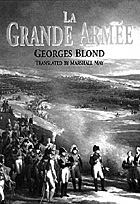 Author: Georges Blond
Author: Georges Blond
Translator: Marshall May
Pages: 543
Illustrations: 14 pages of black and white reproductions of paintings, contemporary drawings, prints, etc.
Maps: 13--seven general strategic and six battle maps showing divisions.
Footnotes: None
Appendices: 5, including Chronology, The Strengths of the Napoleonic Armies, How Many Died?, Rates of Pay, The Fate of the Marshals.
Bibliography: 137 sources grouped chronologically by campaign.
Index: 425 entries in 10 pages.
Publisher: Arms and Armour Press, London
Publication Date: 1995 (English Edition)
Binding: Cloth (hardbound)
ISBN: 1-85409-252-9
Price: $34.95
Summary: Those familiar with the work of Georges Blond, such as La Marne, will welcome his excursion into Napoleonic history. This is the "story" of Napoleon's Grand Army, commencing with the Camp of Boulogne in 1803 and ending with its destruction at Waterloo in 1815. The book resembles a novel rather than a work of military history. It has an extensive bibliography and the there is an ample index, but there are no notes or footnotes. Blond includes many items directly in the text that would usually be in footnote form. For example, when a marshal or prominent general is mentioned, Blond gives you a capsule biography of him at that point.
Blond details the chronological history of the Grande Armee through all its campaigns, battles, and sometimes minor skirmishes, and he does it on a personal level. You will read of the Grenadiers and chasseurs, officers' mistresses and vivandiers, the Imperial Guard and the lowly conscript, all of whom helped build Napoleon's legend.
This is not a book for the Napoleon worshiper. Blond includes many of the Emperor's failings as well as his triumphs. He is contemptuous of military pageantry and particularly dislikes brilliant uniforms, especially those of the flamboyant cavalry leader Marshal Murat.
The book includes a detailed description of the treatment of the wounded from Napoleonic battles. According to Blond, this was essentially no treatment at all. Many students of the period may be familiar with the phenomenal rates of return-to-duty of wounded soldiers treated by Surgeon Larrey. Military doctors did not equal Larrey's success until World War II!
However, Blond notes that Surgeon Larrey's efforts were confined to the Imperial Guard. There were few doctors for the wounded of the regular army. Thus, the majority of wounded either died or recovered on their own. Another doctor, Percy, attempted to do more for the wounded of the line troops but Napoleon never implemented his recommendations. Napoleon was, according to Georges Blond, only concerned with those soldiers present for duty, and, to Napoleon, a soldier's duty was to die.
Blond emphasizes that Napoleon achieved many of his victories by simply moving his armies faster than his opponents. He tells in detail just what such fast moving entailed. The stories are harrowing. In one instance, after a forced march in Spain, a chasseur of the Guard said to his comrades: "I am a good soldier. You have seen me under fire. I would never desert, but this is too much for me." He then put the muzzle of his musket to his forehead and pushed the trigger with his toe. This was a seasoned soldier, not a conscript.
Blond notes that one of the reasons the French Army was able to move so fast was because they usually transported no food with them. The army was expected to live off the country when outside France. Blond states that this resulted in the soldiers being in a chronic state of starvation on campaign. (This assertion is supported by other works, such as Chlapowski's Memoirs of a Polish Lancer, which tells of the ingenuity of foragers during the Russian campaign.)
Another aspect examined by Blond is that by 1809 the "French" Army was one third non-French, and of the French only half were trained soldiers, the remainder being raw conscripts. The proportion of foreigners in the French Army would rise to almost half by 1812.
The description of the Russian campaign is graphic. The campaigns of 1813 and 1814 are also covered and Blond gives praise to the "Marie-Louises" as the conscripts of that time were called. He also treats the Marshals more sympathetically than is typical. Their war-weariness becomes understandable. What good are a chateau and a yearly stipend if you are dead?
Blond seems to blame Soult and Ney for Napoleon's defeat at Waterloo. He points out that Grouchy did not receive orders to join Napoleon once the battle started because Soult, as Chief-of-Staff, sent only one copy. Blond quotes Napoleon as saying: "Berthier would have sent one hundred."
The book ends with the return of the Emperor's remains to France in 1840. Even after so many years and all their sufferings, the old veterans still shouted: "Vive l'Empereur!"
Unfortunately, there are some problems with the book's translation. There is confusion involving words with similar spelling, such as the rivers Rhone and Rhine, and there are several errors in punctuation.
This book is a useful supplement to any Napoleonic library. It gives the soldiers' viewpoint of the Napoleonic Wars. It also makes you appreciate the genius of a man who could motivate his men to endure tremendous hardship and even horrible death. Blond's entertaining book can help the modern reader understand the experience of the French Napoleonic soldier
Other Book Reviews:
-
Napoleon Conquers Austria by James Arnold
On The Napoleonic Wars by David Chandler
Back to Table of Contents -- Napoleon #3
© Copyright 1996 by Emperor's Press.
This article appears in MagWeb (Magazine Web) on the Internet World Wide Web.
The full text and graphics from other military history magazines and gaming magazines are available at http://www.magweb.com